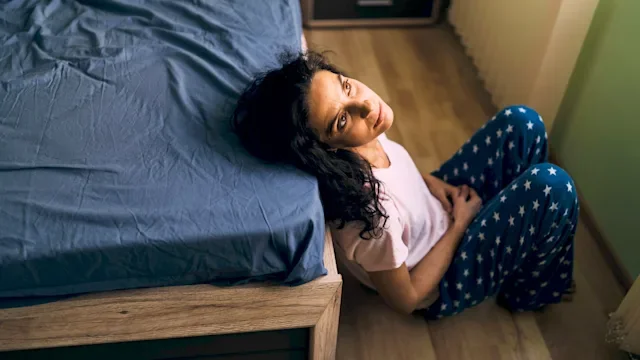Key takeaways:
Anxiety can cause many different physical symptoms, like sweating, pounding heartbeat, and shortness of breath.
Medical problems can cause shortness of breath, too.
In some cases, breathing exercises can be a great way to manage anxiety and regain control of your breath.
If you’ve ever had shortness of breath, you may have worried that something was wrong with your heart or lungs. But sometimes shortness of breath can be caused by anxiety.
Feeling anxious or nervous can cause physical symptoms like a stomachache, racing heart, and breathlessness.
Here we’ll discuss how to tell whether your shortness of breath is related to anxiety — or if it could be caused by a medical condition. We’ll also cover how to reduce breathlessness when you’re feeling anxiety.
What causes shortness of breath from anxiety?
Anxiety can affect your thoughts and feelings. But it also can cause physical changes in your body, called the fight-or-flight response.
This is your body’s way of protecting you from a perceived threat. When you encounter something scary or stressful, your brain sees this as a threat and sends an alert to the rest of your body. This prompts your body to prepare to fight or run away.
Along with other things, your body responds by increasing your heart rate and breathing rate. Fast breathing can make you feel like you’re short of breath. At the same time, your muscles can tense up, making your chest seem tight.
These changes can make you feel like:
You can’t breathe normally.
You’re suffocating or gasping for air.
You can’t take a slow, deep breath.
Is shortness of breath linked to anxiety disorders?
Yes. Shortness of breath can be a symptom of several anxiety disorders. If you have an anxiety disorder, you tend to have frequent symptoms, to the point where they cause difficulty in your day-to-day life.
What does an anxiety attack feel like? Three people share their personal experiences with anxiety attacks.
What can you do to get rid of anxiety? Readers share what they’ve learned about managing anxiety in their day-to-day lives.
When should you get help? Here are signs it’s time to get professional help for your anxiety.
In some cases, anxiety disorders can be more intense or chronic, and may be more likely to trigger physical symptoms like shortness of breath.
Anxiety disorders that can cause shortness of breath include:
Separation anxiety disorder
Read more like this
Explore these related articles, suggested for readers like you.
Besides anxiety, what causes shortness of breath?
It’s normal to feel short of breath from time to time, like when you’re exercising or you run up the stairs. But in some cases, it could be a sign of a medical condition.
Medical problems that commonly cause shortness of breath include:
Chronic obstructive pulmonary disease (COPD)
These health conditions may make it hard for air to flow in and out of your lungs, or for blood to deliver enough oxygen to your body. It’s important to know the difference between shortness of breath from anxiety and from these other causes.
Do I have COPD or asthma?
How to tell if your shortness of breath is from anxiety
Understanding what’s causing your shortness of breath is the first step in addressing it. So, how can you tell whether your shortness of breath is caused by anxiety?
Here are a few clues to look for:
You’re also having other symptoms of anxiety. Anxiety usually causes other symptoms. This could include feeling anxious, nervous, or scared. You may also have other physical symptoms, like a pounding heart, upset stomach, or sweaty palms.
Your symptoms are short-term. Shortness of breath caused by anxiety usually starts suddenly, and goes away within 20 to 30 minutes.
You feel short of breath in certain places or situations. Being short of breath from anxiety can go along with specific places or situations. For example, if you feel short of breath before giving a presentation at work, it’s more likely to be from anxiety than from a medical problem.
It comes and goes. Shortness of breath from anxiety tends to come and go in episodes. If you feel short of breath all the time, it’s more likely to have another cause.
Can shortness of breath cause anxiety?
Yes. If you’re short of breath, it can make you feel more anxious. When you’re short of breath, it may feel like you’re not getting enough oxygen — which in itself is anxiety-inducing.
Anxiety from shortness of breath is especially common among people with lung problems, like COPD or asthma. If you have a health condition that affects your lungs, you may feel anxious about your ability to breathe well.
If shortness of breath is making you feel anxious, talk with a healthcare professional. They can help you put together an action plan for how to manage your breathing, and keep your anxiety under control.
How do you get rid of breathlessness from anxiety?
If you’re feeling short of breath during an anxiety attack, breathing exercises can help. Breathing exercises send signals to your brain that everything is OK. This helps stop the fight-or-flight response, and helps your breathing return to normal.
Here are some breathing exercises to try:
Belly breathing: Place one hand on your belly, and one on your upper chest. Slowly breathe in, deep enough that the hand on your stomach rises. Exhale and let your belly relax. Repeat for several minutes.
Box breathing: Slowly breathe in for a count of 4. Hold with your lungs full for a count of 4. Breathe out for a count of 4. Hold with your lungs empty for a count of 4. Repeat for several minutes.
Alternate nostril breathing: Close your left nostril with your thumb or finger. Inhale slowly through your right nostril. Release your left nostril, and block your right nostril — then exhale through your right nostril. Repeat this pattern for several minutes.
Keep in mind: It’s helpful to practice these exercises ahead of time, so that you’ll be ready to use them when you feel anxious.
Beyond breathing, other things can help to interrupt anxiety as well. Strategies include:
Taking a break from your current situation or setting
Reaching out to a supportive friend or family member
Listening to music
Using grounding techniques, which are ways to practice mindfulness
Playing with a pet
Going for a walk
Using a weighted blanket
When should you see a doctor?
If shortness of breath is getting in the way of your day-to-day life, talk with a healthcare professional. They can help figure out what’s causing your breathlessness, and work together with you to get an accurate diagnosis and make a treatment plan.
And remember: Shortness of breath can sometimes be a medical emergency. You should call 911 or go to the emergency room if you have any of the following signs or symptoms:
You’re gasping for air, or feel like you’re choking or drowning.
You’re making a wheezing or gurgling noise when you breathe.
You can’t talk or can only manage a few words.
Your breathing is irregular, or especially slow or fast.
Your chest feels “tight” or hurts.
You have pain that spreads to your arm, jaw, neck, or back.
Your lips, skin, or fingertips are turning pale, blue, or gray.
You’re confused or lightheaded.
You lose consciousness.
Frequently asked questions
There are many reasons why this can happen. If you have heart or lung problems, or a respiratory infection, lying down can cause more blood and fluid to enter your lungs, making it harder to breathe.
But some people also find their anxiety is worse at night. In these cases, they might feel their breathing gets worse when they’re lying down trying to get to sleep.
Shortness of breath doesn’t always cause low levels of oxygen. In fact, when you’re in fight-or-flight mode, your body is actually working hard to increase your oxygen levels — to get ready for action. On the other hand, if your oxygen levels are low, it can make you feel short of breath. This is common in people with heart or lung problems, for example.
Hormone changes during pregnancy can affect your breathing patterns. Not only that, as your uterus grows in size, this can also put pressure on your diaphragm, making it feel like it’s harder to breathe.
There are many reasons why this can happen. If you have heart or lung problems, or a respiratory infection, lying down can cause more blood and fluid to enter your lungs, making it harder to breathe.
But some people also find their anxiety is worse at night. In these cases, they might feel their breathing gets worse when they’re lying down trying to get to sleep.
Shortness of breath doesn’t always cause low levels of oxygen. In fact, when you’re in fight-or-flight mode, your body is actually working hard to increase your oxygen levels — to get ready for action. On the other hand, if your oxygen levels are low, it can make you feel short of breath. This is common in people with heart or lung problems, for example.
Hormone changes during pregnancy can affect your breathing patterns. Not only that, as your uterus grows in size, this can also put pressure on your diaphragm, making it feel like it’s harder to breathe.
The bottom line
Anxiety can cause different symptoms, including shortness of breath. Medical problems can make you feel short of breath, too. But if your breathlessness happens with symptoms of anxiety, or if it’s short-lived, it could be caused by anxiety rather than a medical problem.
Breathing exercises and other strategies can calm anxiety in the moment, and get your breathing back to normal. If shortness of breath is making daily life hard, consider reaching out to a healthcare professional for support.

Why trust our experts?



References
American Lung Association. (n.d.). Shortness of breath.
American Lung Association. (2024). How to decrease anxiety and increase your breath.
American Psychological Association. (2024). Stress effects on the body.
American Red Cross. (n.d.). Respiratory distress (trouble breathing).
FamilyDoctor.org. (2023). Shortness of breath.
Jerath, R., et al. (2015). Self-regulation of breathing as a primary treatment for anxiety. Applied Psychophysiology and Biofeedback.
Nemours KidsHealth. (2023). Why do some women feel short of breath during pregnancy?
Paulus, M. P. (2013). The breathing conundrum – interoceptive sensitivity and anxiety. Depression and Anxiety.


















